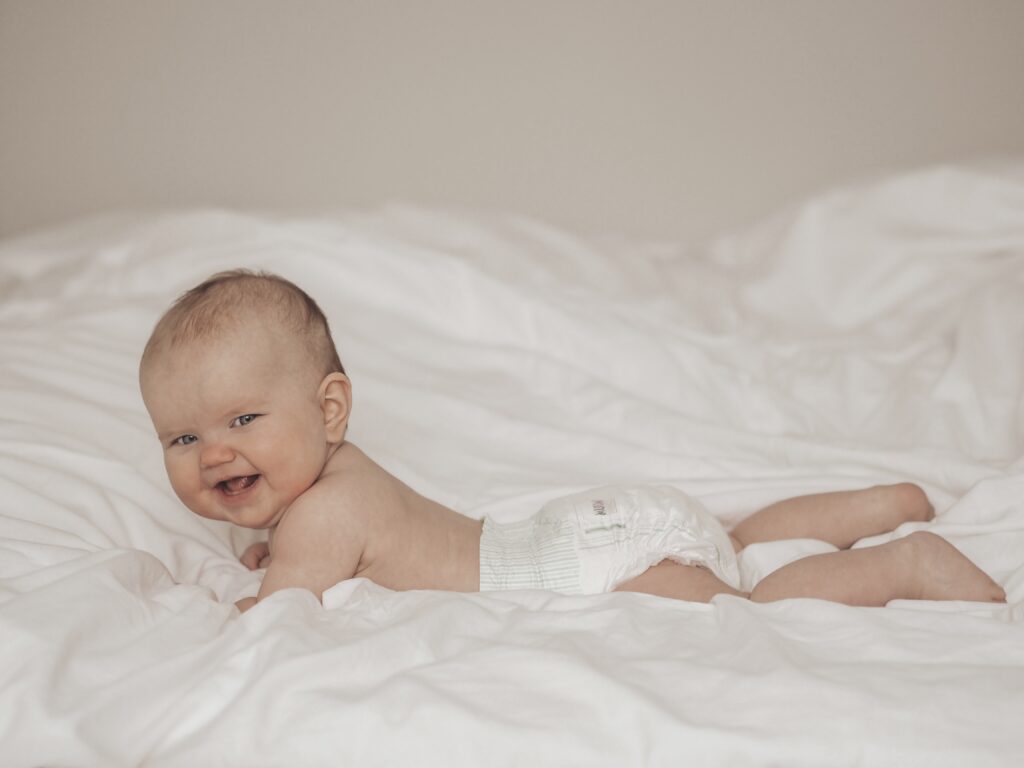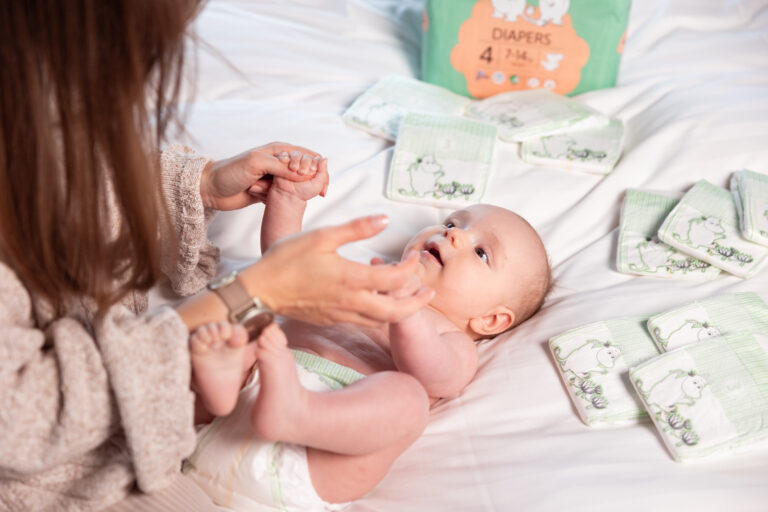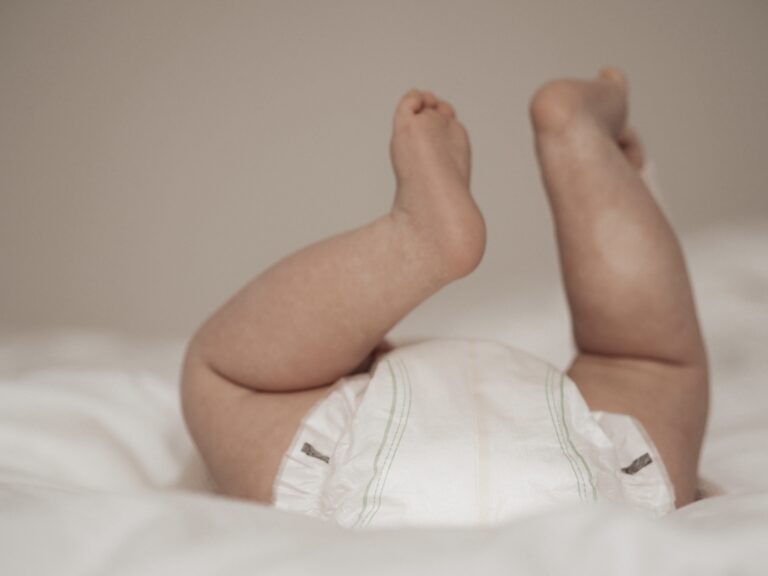When talking about baby’s flatulence, many new parents nod when they recognize the situation. Although they are common and usually harmless, they can still cause concern for parents. When a baby struggles with flatulence, parents’ hearts can break with compassion. But what exactly causes flatulence and how can it be relieved? In this article, we share the most important advice and tips that can help make the little one feel better and bring peace to the family’s everyday life.
Prevalence and causes of baby’s flatulence
Flatulence is a common challenge for many babies. Up to 30% of babies suffer from them, especially at the age of 3-4 months. The most common cause of flatulence is the low development of the baby’s digestive system. Babies’ intestines do not yet have enough bacteria to help with digestion and gas removal. In addition, babies swallow a lot of air when eating, which increases the formation of gas in the intestines. Air can get into the intestines during breastfeeding or bottle feeding if the baby does not take the nipple or baby bottle into their mouth correctly. Some babies may also be hypersensitive to certain proteins found in either breast milk or formula. This hypersensitivity can cause other symptoms in addition to flatulence, such as diarrhea or abdominal pain. Although baby’s flatulence can be troublesome for both the baby and the parents, it’s important to remember that it’s usually harmless and will get better over time as your baby’s digestive system develops.
Why is your baby not pooping? Read here!
Signs of baby flatulence: How to recognise them?
Flatulence can cause discomfort for your baby, and often the only way to notice this is to observe your baby’s behaviour and reactions. Typical symptoms include restlessness and crying, especially after eating. The baby may show signs of discomfort, such as squirming, lifting the legs towards the tummy and clenching the hands into fists. In small babies, difficulty in passing gas can cause repeated, intense crying episodes that can last for hours. This is because the baby’s digestive system is still developing and the baby may not be able to let the gas out on its own. Flatulence can also cause increased gurgling, especially after eating. Although these symptoms can be worrying, it is important to remember that they are usually part of normal development and will ease as the baby’s digestive system develops.
Read about normal baby poop and when to worry here!
Effect of mother’s diet on baby’s flatulence
There are many factors that can affect a baby’s flatulence, and one of them is the mother’s diet. In particular, when breastfeeding, the foods eaten by the mother can affect the baby’s flatulence. Certain foods, such as beans, cabbage, onions and dairy products, can cause gas to build up in the baby’s intestines. It is important to avoid foods that may cause indigestion for yourself, as they may also affect your baby in the same way. In addition, caffeine and carbonated drinks can cause flatulence in your baby. Although every mother and baby is different, it is a good idea to try dietary changes if you notice your baby suffering from recurrent flatulence. The key is to keep a food diary and observe any possible links between certain foods and your baby’s flatulence. However, always remember to listen to your body and take care of your nutritional intake while breastfeeding.
Try different techniques and find the one that works best for your baby!
Relieving baby’s flatulence at home: Effective postures and exercises
You can help your baby’s flatulence by trying different positions and exercises to help release gas. An effective position is, for example, to hold the baby on their stomach in the mother’s or father’s lap, which puts pressure on the baby’s stomach and helps the gas escape. A cycling exercise where you move the baby’s legs to resemble pedalling a bicycle can also help. In addition, keeping the baby upright for 15-30 minutes after each feeding can help prevent gas build-up. Remember, however, that each baby is individual, so what works for one may not work for another. Try different techniques and find the one that works best for your baby!
Massages and heat: Gentle methods for relieving flatulence
Massaging your baby’s tummy is an excellent way to gently relieve flatulence. There are several simple massage techniques that parents can use on their baby. For example, the I love U technique, which involves gently massaging the baby’s tummy in I, L and U-shaped movements, is useful. The massage should only be done with light pressure so that the baby’s tummy only receives a small amount of pressure. Massaging should be avoided when the baby has just eaten or is hungry. Heat treatments, such as giving a warm bath or placing a heating pad on the baby’s tummy, can also help to relax the abdominal muscles and assist gas release. Remember that these measures must always be done carefully and safely, taking into account the baby’s sensitive stomach. If the baby seems to feel uncomfortable, massaging or applying heat should be stopped immediately.
Gurgling and flatulence: How to tell the difference?
Gurgling and flatulence are common challenges in baby life. Gurgles occur when a baby pushes food or milk into or out of their mouth during or after eating. This usually does not cause the baby any pain and is a normal part of the baby’s development. On the other hand, flatulence can cause the baby discomfort and even pain. It is important to distinguish between gurgling and flatulence in order to provide the right treatment and help. Common symptoms of flatulence include crying, abdominal distension and pain, bloating and gas leakage. Gurgling, on the other hand, does not usually have these symptoms. If you are unsure or worried about your baby’s symptoms, it is always a good idea to discuss the matter with a healthcare professional.

When is it time to seek professional help?
It is common to worry about baby flatulence, which can cause your baby obvious discomfort. However, in most cases they are a normal part of the baby’s development. There are still situations where it is important to contact a health professional. If your baby’s flatulence persists for a long time, has a strong effect on their mood, makes it difficult to sleep or eat, or has other symptoms such as abdominal pain, diarrhea, vomiting or blood in the stools, you should contact a doctor or a clinic. Also, if the baby is not growing or developing normally, or if the mother is worried about her own diet and its possible effects on the baby, it is a good idea to seek professional advice. Remember, you know your baby best. Do not hesitate to contact a professional if you are concerned about your own or your baby’s well-being.
Burping: Techniques and their importance
Burping is an important way to help the baby let out the air swallowed during feeding and at the same time temporarily reduce the baby’s flatulence. There are several ways to burp your baby. One common way is to hold the baby on your shoulder with their tummy against the parent’s shoulder, while patting or gently rubbing the baby’s back. Parents can also try sitting the baby on their lap and patting the baby’s back at the same time. Every baby is different, which is why it is important to try different ways and find the one that works best for your baby. Burping is usually necessary until the baby learns to eat without swallowing air, which usually happens around 4-6 months of age. However, it is important to remember that if your baby does not burp after eating, this may not be a problem, especially if your baby seems otherwise well and does not suffer from flatulence.
The role and impact of probiotics on baby flatulence
Probiotics are living micro-organisms that are part of the normal bacterial flora of the gut. They can promote healthy bowel function and relieve flatulence. One of the most commonly recommended probiotics for babies is Lactobacillus reuteri, which may reduce crying and colic episodes. Research suggests that the use of probiotics may help reduce the occurrence and severity of baby flatulence. However, it is important to bear in mind that probiotics are not a miracle cure and their effects may vary from individual to individual. If you are considering using probiotics for your baby, talk to your doctor or pharmacy staff first. They can recommend the appropriate probiotics and dosages for your baby and give you advice on their safe use.
Why are Moomin Baby diapers best suited for babies with flatulence problems?
Finnish Moomin Baby diapers are specially designed with babies’ comfort and sensitive skin in mind. They are made from carefully selected, clean and soft materials that do not irritate sensitive skin. The particularly breathable materials help to keep baby’s skin dry and fresh, which is particularly important in the case of diarrhea caused by flatulence. In addition, Moomin Baby diapers are highly absorbent, which means they can keep moisture away from baby’s skin. This helps the baby to feel more comfortable, which in turn can help the baby to relax and let air out more effectively.
Check out all our Moomin Baby products here!










